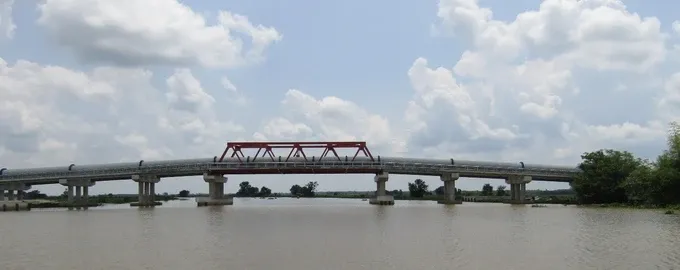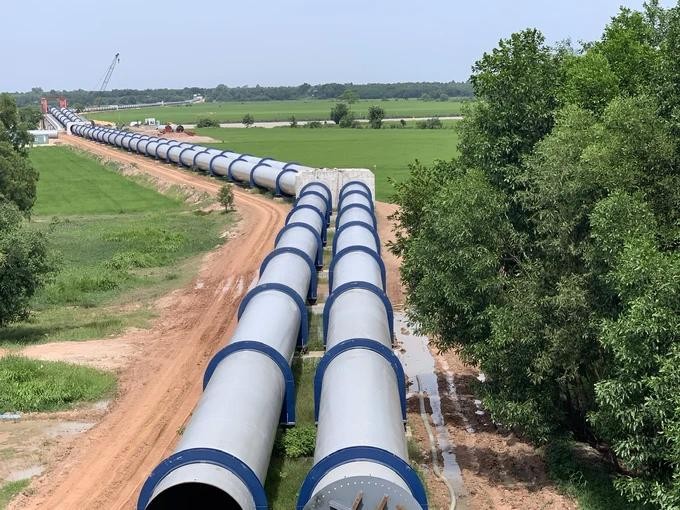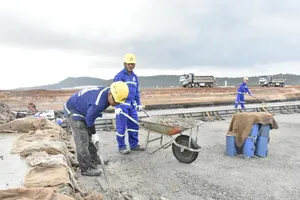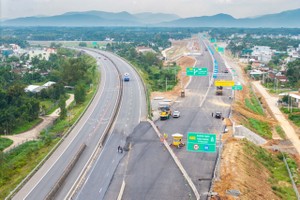
Tay Ninh Province used to be one of the localities enduring the most serious effects of drought. Water shortage led to frequently low yield. However, since the completion of the irrigation project for the West of Vam Co Dong River (stage 1) in 2023, water from Dau Tieng Reservoir is cleverly distributed to the districts of Chau Thanh and Ben Cau, this shortage is basically addressed.
Farmer Nguyen Van Bay from Long Phuoc Commune of Ben Cau District happily shared that formerly, irrigation water was taken from family wells, which was extremely costly but not very effective. Thanks to the links of local canals to the irrigation project for the West of Vam Co Dong River, farmers receive more water to nurture their crops.
The Agriculture and Rural Development Department of Tay Ninh Province informed that the province now has four reservoirs, namely Dau Tieng, Tha La, Nuoc Trong 1, and Nuoc Trong 2, along with 10 water pump stations, more than 2,000 irrigation canals, and 24 dikes to basically form a closed area for agricultural activities. This system can accommodate 75 percent of the agricultural coverage.
Since 2023, people in the project area have completely used self-flow irrigation water to save cost and increase crop quantity as well as profit. They are confident to switch to high-value crops to improve their income.
Similarly, in districts with large agricultural land like Bac Tan Uyen or Phu Giao of Binh Duong Province, the local irrigation system is quite complete to serve the public’s needs so that farmers can increase crop number and yield. There are now 8 irrigation works with two reservoirs (Da Ban – Suoi Sau and Doc Nhan), 6 water pump stations, and 71km of irrigation canals in Bac Tan Uyen District with a capacity to water nearly 790ha.
Farmer Le Minh Sang in this district eagerly stated that he has joined hand with his neighbors to grow 60ha of grapefruit. He used to depend on simple drilled wells and rainwater to supply his fruit trees in dry seasons, but can now benefit from the dense irrigation canal system as well as small streams to have better yields.
According to the Agriculture and Rural Development Department of Binh Duong Province, the irrigation works in the province are showing their strengths in this dry season. They are also extremely effective during flood time.

Nevertheless, to better cope with negative influences of climate change and prolonged drought, people should implement more advanced technologies into their agricultural activities. They are advised to choose drought-resistant varieties, to switch from small-scale farming to larger one in order to apply automatic, cost-effective watering systems. This will finally raise their crop yield and quality, leading to higher competitiveness.
Aware of the danger of prolonged drought until June 2024, Director Nguyen Dinh Xuan of the Tay Ninh Province Department of Agriculture and Rural Development commented that there will be inevitable water shortage in certain locations, especially those out of the reach of the current irrigation works or in high terrain.
Therefore, his organization has consulted the provincial People’s Committee to launch the project ‘Developing infrastructure for smart agricultural chains to adapt to climate change in Tay Ninh Province’, taking capital from the loan by Asian Development Bank. This project includes the construction of irrigation and traffic facilities for smart agriculture and elimination of water shortage in agricultural activities.
Furthermore, the province advises its residents to form a flexible farming plan where seeds are sown simultaneously and concentratedly, high-quality drought-resistant short-term varieties are chosen, watering is carried out alternately at the most needed time of each crop, and water is stored in local reservoirs.
























